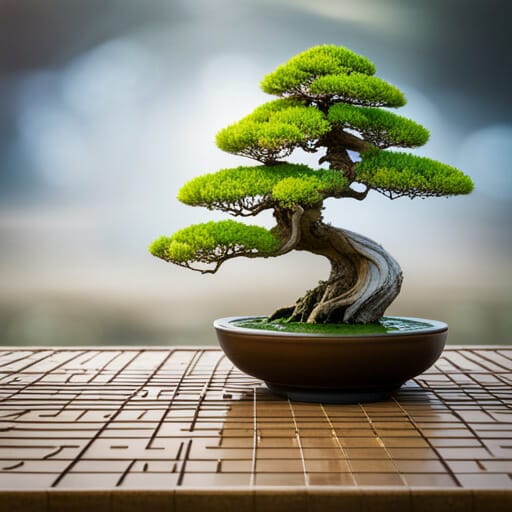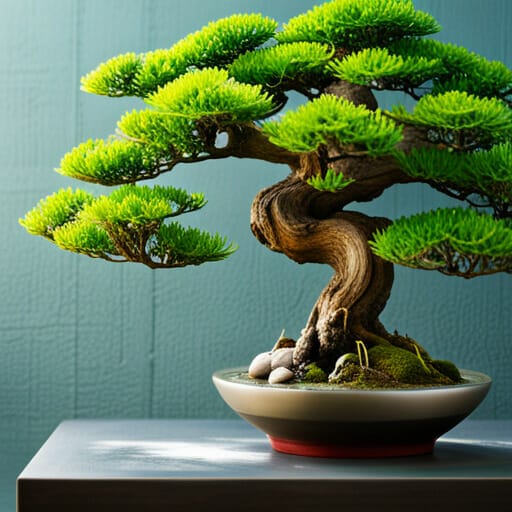Bonsai trees, with their intricate beauty and captivating charm, have long been revered as symbols of good luck and fortune. These miniature landscapes embody the principles of Feng Shui, an ancient Chinese practice that seeks to cultivate positive energy and harmony in our surroundings.
The art of bonsai emphasizes the harmonious coexistence between nature and humans, with certain tree species playing a vital role in achieving this balance. Evergreens like bamboo and pine, known for their resilience and longevity, are particularly significant in Feng Shui as they symbolize life and growth. In Japan, these trees are considered auspicious and are often used in New Year decorations. Other trees, such as maple and ancient banyan, also hold importance in different regions as Feng Shui trees.
While bonsai trees themselves are not inherently lucky, their proper care and cultivation, in accordance with the principles of Feng Shui, can help maintain a positive energy flow and bring luck to those who believe in it.
In this article, we will explore the significance of bonsai, delve into the connection between Feng Shui and bonsai, and uncover the essential aspects of caring for these remarkable trees.
Contents
- 1 Quick Points
- 2 The Significance of Bonsai
- 3 Feng Shui and Bonsai
- 4 Caring for Bonsai Trees
- 5 Frequently Asked Questions
- 5.1 What are the different types of bonsai trees that are considered lucky in Feng Shui?
- 5.2 Can bonsai trees be placed in any area of the house for good luck, or are there specific guidelines to follow?
- 5.3 Are there any specific rituals or practices associated with bonsai trees to attract good luck?
- 5.4 Are there any specific colors or shapes of bonsai pots that are believed to enhance the luck of the tree?
- 5.5 Can bonsai trees be used to remedy or improve specific areas of life, such as career, relationships, or health, according to Feng Shui principles?
Quick Points
- Bonsai trees symbolize fortune, prosperity, and longevity.
- Bonsai is closely related to Feng Shui, an ancient Chinese practice rooted in harmonious coexistence with nature and humans.
- Evergreen species like bamboo, pine, and cypress are commonly planted as Feng Shui trees.
– Bonsai trees themselves are not symbols of good luck, but certain evergreen and deciduous trees are considered auspicious, especially in Japan.
The Significance of Bonsai

The significance of bonsai lies in its representation of fortune, prosperity, and longevity, as well as its close association with the principles of Feng Shui, which aims to achieve harmony between nature and the surrounding environment.
Bonsai trees are considered an art form, where miniature landscapes are created using plants in a bonsai pot. In Feng Shui, evergreen trees such as bamboo and pine are important for good energy flow. These trees symbolize life, growth, and are traditionally seen as lucky symbols in Japan. Bonsai trees themselves are not symbols of good luck, but certain evergreen and deciduous trees used in bonsai can bring luck if one believes in it.
Care should be taken to maintain the positive energy flow of bonsai trees, ensuring they receive adequate sunlight and are not kept indoors for too long. Bonsai trees can also be gifted to others as a means of sharing luck and positive energy.
The significance of bonsai lies in its ability to embody principles of fortune, prosperity, and longevity, while also serving as a manifestation of harmony with nature through its association with Feng Shui.
Feng Shui and Bonsai

In the practice of creating miniature landscapes with plants in a bonsai pot, the art of bonsai is closely intertwined with the ancient Chinese philosophy of achieving balance and coexistence with nature and the environment. This philosophy, known as Feng Shui, aims to bring good energy, or Qi, around humans.
Bonsai trees, when used in Feng Shui, serve as a way to harmonize the energy flow in a space. Here are three ways in which Feng Shui and bonsai are connected:
- Symbolic representation: Bonsai trees, like other plants, symbolize life, growth, and longevity in Feng Shui. They bring the energy of nature indoors and create a sense of tranquility and harmony.
- Placement and direction: According to Feng Shui principles, the placement and direction of bonsai trees in a space can affect the flow of energy. It is important to position bonsai trees in areas where they can receive ample sunlight and good air circulation.
- Tree species: Certain tree species, such as evergreens like bamboo and pine, are considered auspicious in Feng Shui. These trees are believed to bring luck and prosperity when used as bonsai trees in the practice of Feng Shui.
Overall, the art of bonsai and the principles of Feng Shui go hand in hand, aiming to create a harmonious and balanced environment that promotes positive energy and well-being.
Caring for Bonsai Trees

Caring for bonsai trees involves ensuring proper sunlight and air circulation to maintain their health and vitality. Sunlight is essential for most bonsai trees, especially evergreen species, as they are sun-loving plants. It is important to place the bonsai tree in a location where it can receive adequate sunlight, preferably in a south-facing window or outdoors.
Additionally, proper air circulation is crucial to prevent the development of diseases and pests. Regularly check the bonsai tree for any signs of pests or diseases and take appropriate measures to address them.
Furthermore, watering the bonsai tree should be done carefully, avoiding both overwatering and underwatering. It is recommended to water the tree thoroughly and allow the soil to slightly dry out between waterings.
Overall, providing the necessary care and attention to bonsai trees will ensure their longevity and enhance their beauty.
Frequently Asked Questions
What are the different types of bonsai trees that are considered lucky in Feng Shui?
There are several types of bonsai trees that are considered lucky in Feng Shui, including evergreens like pine, bamboo, and cypress. These trees symbolize prosperity, longevity, and good fortune in the practice of Feng Shui.
Can bonsai trees be placed in any area of the house for good luck, or are there specific guidelines to follow?
Bonsai trees can be placed in any area of the house for good luck, but there are specific guidelines to follow for optimal Feng Shui. These guidelines include considering the type of tree, its placement, and ensuring proper care and maintenance.
Are there any specific rituals or practices associated with bonsai trees to attract good luck?
There are no specific rituals or practices associated with bonsai trees to attract good luck. The belief in the luck associated with bonsai trees is subjective and varies among individuals.
Are there any specific colors or shapes of bonsai pots that are believed to enhance the luck of the tree?
There is no specific evidence or belief suggesting that colors or shapes of bonsai pots can enhance the luck of the tree. The focus in bonsai is more on the overall aesthetic and health of the tree.
Can bonsai trees be used to remedy or improve specific areas of life, such as career, relationships, or health, according to Feng Shui principles?
Bonsai trees can be used to remedy or improve specific areas of life, such as career, relationships, or health, according to Feng Shui principles. They are believed to bring positive energy (Qi) and create a harmonious environment, enhancing the desired aspects of life.




